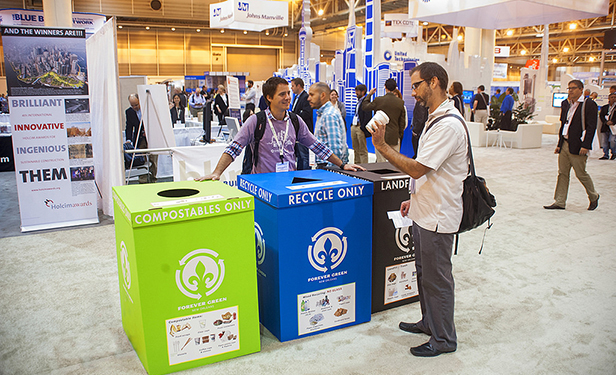Green Interview: Julia Spangler, Sustainable Events Consultant

Julia Spangler is a sustainable events consultant and speaker specializing in waste diversion and zero waste events. Her website urges people to make sustainability a part of their events’ success stories and her services include green events, green weddings and helping venues become more sustainable. Spangler also recently launched an online course, “How to Plan Zero Waste Events,” that teaches event organizers how to keep waste out of the landfill, improve guest satisfaction and achieve zero-waste results.
I met Spangler at the ILEA Live 2018 conference, where she presented a breakout session on holding zero-waste events. I wasn’t able to attend her session but had the opportunity to connect after the event to ask her about her business and best practices for event sustainability. Here are some highlights from our conversation.
Danalynne Wheeler Menegus: How did you end up being a sustainability consultant for events?
Julia Spangler:I went to college for graphic design and after I graduated, I got a job as a graphic designer. I was part of the marketing department, which also put on all of that company’s events. I had no real knowledge of the events world before then but really fell in love with it as I worked on event design projects and was able to be onsite at events and see how everything comes together.
But, I also saw a lot of the waste first-hand. I’ve always been into sustainability and recycling in my personal life, so not having this thing that I loved also be really wasteful was important to me. I wanted to try to figure out a way to help resolve the waste issue and that’s what ultimately gave me the idea to start my business. There aren’t a lot of companies that focus on zero waste specifically, so it’s a lot of education and getting people comfortable with the idea until they’re ready to make a move on it.
DWM: When you’re talking about sustainability and zero-waste events, what goes into that? What are the easiest things to implement and is a complete zero-waste event really possible?
JS: A zero-waste event is definitely possible but it does take a lot of planning up front. You may be saying “no” to some things that you have always done or doing things in a different way. Some of the easiest steps are trying to identify what the most wasteful aspect of your event is. Maybe you’re serving on all disposable dishes and using plastic cups or handing out a lot of bottled beverages, things like that. Identifying opportunities to switch those out for reusable items is definitely easier than processing a ton of waste generated at the event.
Choosing reusable suppliers and reducing waste in the first place is ultimately more beneficial as well, but it really depends on your event and the style of event that it is. Meals are often the biggest driver of waste but if you’re already serving on china for your event that may not be your biggest source of waste. The most beneficial place to start is figuring out where your waste is coming from.
DWM: How about things like printing? That’s been an area I’ve seen a lot of cutbacks in over the past decade or so.
JS: Reducing printing is still definitely a big part of it. A lot of signage material is actually recyclable if you print directly on the plastic rather than directly on a vinyl sticker. I would recommend having a candid conversation with your printer and whoever is making your materials and your signs.
If you’ve never asked for alternative materials or how to recycle the materials that you’ve always been ordering, there may be options that you just don’t even know about because you never discussed it. There are options that can be both recyclable or reusable, which is even better and still have the same professional look.
DWM: What else can people do to make their event more sustainable?
JS: I always urge people to look at the items that they’re giving away as an opportunity to reduce waste. Instead of pre-stuffing bags of swag, you can have your amenities set up on tables where people can choose to pick up those items if they’re interested. That can also provide an opportunity for you to order fewer items because not everyone is going to take one.
Also, design your giveaways to be usable for multiple events for multiple years. That principle also applies to signage: avoid printing dates or one-off locations if you can, so you can reuse them.
DWM: How many suppliers and venues are already thinking about or actively implementing sustainable practices?
JS: In the region where I work, primarily in the Midwest/ Central Indiana region, there are not a lot of venues and vendors who are already working on sustainability, so there’s a big opportunity here for improvement in that area. And again, the difficulty of implementing depends a lot on the scale of the event – it’s actually pretty easy to implement some of these things at smaller or one-day events. Obviously, the complexity increases if you’re looking at multi-day events or conferences or conventions, but a lot of the steps are repeatable once you know the areas to focus on.

DWM: How does sustainability typically impact an event budget?
JS: It depends a lot on the market where your event is being held. Some areas have high landfill tipping fees, so in those areas, diverting your waste from the landfill to other streams like recycling or composting can actually be more cost-effective. Another way to generate revenue or offset costs is to separate out the valuable materials such as aluminum cans or cardboard – many recyclers will pay people for those materials.
In other areas of the country where it’s very inexpensive to take trash to the dump, it may actually be more expensive to use other forms of disposal. But again, you could still potentially make money from recycling in those markets and it’s also important to look at the overall value of the program as opposed to simply the monetary line item. The results that you generate from a program like this could be very attractive to future sponsors, future attendees and other stakeholders who can help your event make money in the long run.
DWM: What do you see as the biggest barriers to sustainability for event planners?
JS: The biggest barrier to entry that I have found is just that sometimes leadership doesn’t care. So if you’re not in a market where the cost savings are dramatic, you might have a harder time making a case. There’s definitely still a ton of value in having results that you can share and prove that your company cares about sustainable practices.
Sustainability is a value that’s particularly important to Millennial and Gen Z audiences. The demand for this type of program is only going to grow – and in order to stay relevant to these audiences it may become a necessity – but some event manager and corporate leaders are more old school and they don’t feel a lot of intrinsic motivation to go this way.
My philosophy is to work with people to whom sustainability matters right now. At some point, either a change in viewpoint or even pressure from industry peers might get other organizations on board.
DWM: What would you recommend for an event planner in that situation – someone who cares about sustainability but whose management doesn’t find it important?
JS: If there are cost-saving or revenue-making opportunities, start with those and then start with anything that’s immediately within your control. If the cost is minimal, your leadership may not care if you switch from disposables to real china plates – and it might actually make the event look nicer. Do the things that are within your control to do and if it’s for a bigger or more complex program that requires a larger investment, try to prove your success with those early steps.
DWM: Is there any specific element that is critical to success when planning a zero-waste event?
JS: I want to emphasize the communication aspect of zero-waste events. It’s so important to communicate your waste guideline to all of your event’s stakeholders, whether that’s your guests, your vendors, your exhibitors or anyone else who is involved. Make sure everyone is on the same page about understanding the plan, goals and what is recyclable or what is compostable.
With events, people are coming from all different parts of the country or even different parts of the world, where different things are accepted for recycling or for composting. So it’s important to clearly communicate what is recyclable or compostable in the context of your event so that you don’t end up with a big contamination problem afterward. A bin that just says “recycling” is about as effective in my eyes as just a trash bin because I don’t know what they’re accepting or not.
DWM: How do you recommend planners get these communications out to their stakeholders?
JS: I recommend using a few different streams. Obviously, you want to have signs on your waste bins. At the point of disposal, people need to know what goes in each bin. Make sure those signs are extremely clear by using both images and words.
Also, talk about this aspect of the program in your traditional event communications – your website, emails, signage, event app or anyplace else you are able to make announcements like during registration check-in or in an opening keynote.
Conduct any training of behind-the-scenes groups ahead of time, making sure that your staff, volunteers and any vendor and venue staff are up to speed on the zero waste guidelines. Give them the opportunity to ask questions so that they’re not confused at the event.
Don’t miss any event news! Sign up for any (or all) of our e-newsletters HERE & engage with us on Twitter, Facebook, LinkedIn & Instagram!


Add new comment